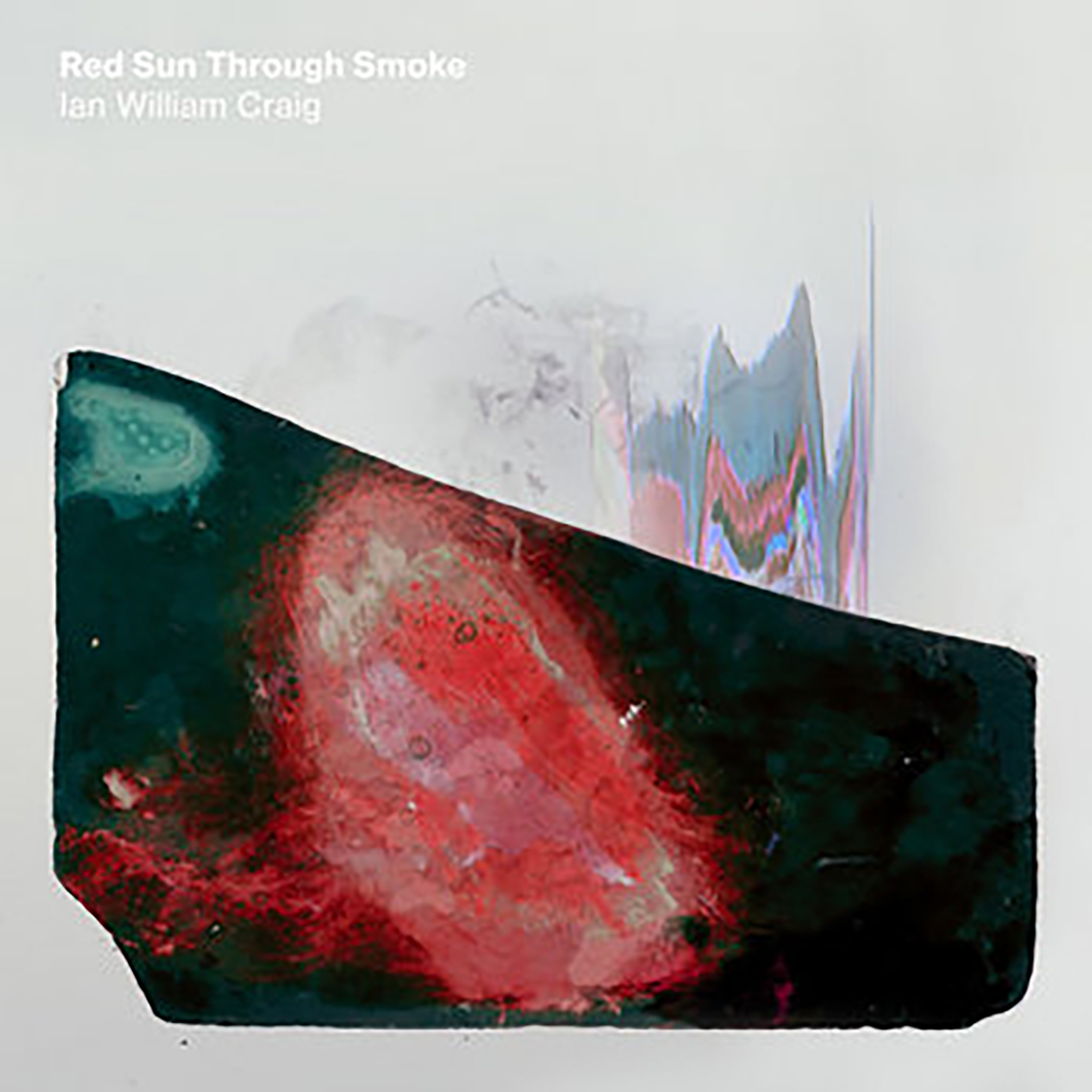Ian William Craig, "Red Sun Through Smoke"
 I am generally not someone who believes that everything happens for a reason or that tragedy breeds great art, but I do think that the emotionally fraught and unusual circumstances surrounding the creation of Red Sun Through Smoke steered Ian William Craig in a direction that feels uncannily appropriate for the current moment. Craig's original plan was simply to sequester himself for a couple weeks in his grandfather's empty house in Kelowna, British Columbia while he wrote and recorded a new album. As it turned out, however, fate had quite a macabre cavalcade of unpleasant surprises in store for him, as Kelowna became surrounded by forest fires, his grandfather died, his parents moved into the smoke-shrouded house, and the woman he loved moved to Paris. Naturally, all of those events resulted in quite an intense swirl of emotions, but at least a correspondingly intense (and beautiful) album ultimately emerged from that fraught period, as the best moments of Red Sun Through Smoke distill Craig’s art to its simplest, most direct, and most intimate form.
I am generally not someone who believes that everything happens for a reason or that tragedy breeds great art, but I do think that the emotionally fraught and unusual circumstances surrounding the creation of Red Sun Through Smoke steered Ian William Craig in a direction that feels uncannily appropriate for the current moment. Craig's original plan was simply to sequester himself for a couple weeks in his grandfather's empty house in Kelowna, British Columbia while he wrote and recorded a new album. As it turned out, however, fate had quite a macabre cavalcade of unpleasant surprises in store for him, as Kelowna became surrounded by forest fires, his grandfather died, his parents moved into the smoke-shrouded house, and the woman he loved moved to Paris. Naturally, all of those events resulted in quite an intense swirl of emotions, but at least a correspondingly intense (and beautiful) album ultimately emerged from that fraught period, as the best moments of Red Sun Through Smoke distill Craig’s art to its simplest, most direct, and most intimate form.
When I listened to this album for the first time, one of the thoughts that immediately struck me was how much Craig’s creative trajectory uncannily mirrors that of Grouper's Liz Harris: both artists initially established themselves by carving out a distinctive style, then set about slowly dissolving that stylistic veil to reduce their palette to little more than a voice and a piano.As someone who loves what Craig can do with his arsenal of wobbly, hissing tape players, I cannot say that I unambiguously prefer this more naked approach to songcraft, but I certainly admire and appreciate his desire to make his art more honest and distilled.That said, Craig's transformation is still a work in progress, so Red Sun Through Smoke strikes an effective balance between his experimental/abstract side and his more songcraft-driven side.Both sides yield some wonderful results, but it is definitely the unadorned and heartfelt piano ballads like "Weight" and "Stories" that feel like the album's true soul and raison d’être.Admittedly, I have not historically been thrilled when an experimentally minded musician that I love decides to sit down at a piano to try their hand at nakedly intimate balladry, as people tend to fall into extremely familiar patterns with that instrument.Much like harps and harmoniums, it is deceptively easy to make a piano sound good, but extremely difficult to find and establish a distinctive voice.To his credit, Craig solved that problem beautifully in "Weight" by playing in an organically loose and fluid way that is shaped by the central vocal melody.There is a chord progression, but Craig seems far more interested in the way the notes linger and dissolve in the wake of his vocal phrases than he does in creating a structured foundation to sing over.Also, the rhythm feels far more dependent upon Craig's own breathing patterns than it does with any unchanging time-signature.
As far as I am concerned, "Weight" stands as both the album’s achingly beautiful centerpiece and the culmination of Craig’s evolution as a composer, as it seamlessly merges tender, lilting melodies with hiss-ravaged harmonies in near-rapturous fashion.The following "Comma" is similarly lovely though, as Craig's voice nimbly swoops and slides around in the higher registers in a way that would make a soul/R&B diva proud.Also, the underlying music captures Craig at his most inventively minimalist and texturally effective, as frayed swells of harmonized vocals provide an unconventionally ghostly and warbling backdrop.Craig later repeats that delightful trick once more with "Take," but the remainder of the album is generally an impressively varied suite of songs and vignettes that take his hyper-constrained palette in some very interesting and divergent directions.Granted, some of those directions work much better than others, as I cannot say that I would miss the a capella opener "Random" or the piano instrumental "Mountains Astray," but the hit-to-miss ratio is nevertheless quite an impressive one overall. I am especially fond of two of the more tape loop-based pieces, particularly the scratchy, disjointed, and rippling arpeggio layers of "The Smokefallen."The darker and more spidery "Last of the Lantern Oil" is quite haunting as well, as fragments of Craig's vocals warble and flutter in a haze of decaying, distorted, and deconstructed minor key piano chords.
Notably, "Last of the Lantern Oil" features some noises from a shortwave radio that Craig remembers fondly from his late grandfather's days as a ham radio enthusiast.Those sounds are not a terribly crucial part of the piece, but their impact on Craig's art cannot be overstated, as he has observed that "all of the sounds inherent to that process, from the crackling static to the disembodied voices breaking up to the glissando of the frequency dial searching for connection, have directly informed what it is that I do."Craig's grandfather also deserves some credit for his decision to partially move away from that aesthetic, however, as Craig notes that his own interest in "themes of decay and forgetting" began to feel false as his grandfather increasingly deteriorated from dementia.I get that, but I personally hope that he continues dabbling with his decaying loops forever anyway, as that is what made me first fall in love with his work.I can certainly embrace Red Sun Through Smoke's more poignant balance of openness and emotional depth to abstraction and experimentation for now though.Moreover, I suspect that gradual transformation was not easy for Craig (given his reluctance to even sing on his early albums), but that unflinching and fearless examination of what he wants to say and how he needs to say it is precisely why he has blossomed into one of the most gifted artists of his generation.I would not necessarily call this album raw, as Craig was very exacting in shaping how these pieces sound, but there has been a significant decrease in the amount of artistic distance that he allows to creep into his work. In fact, Red Sun Through Smoke is quite literally a diaristic album (the lyrics were culled directly from Craig's journal) and it is all the better for it.While I could probably make a strong case that some of Craig’s other albums have more great songs, none of them have left a deeper mark, taken more chances, or made a stronger statement than this one.
Samples can be found here.



